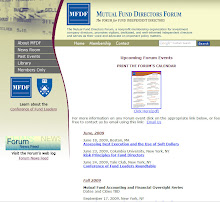The SEC staff issued a no-action letter providing relief under Section 17(d) and Rule 17d-1 of the 1940 Act allowing registered U.S. open-end investment companies and certain foreign open-end investment funds managed by affiliated advisers to enter into a joint global, unsecured, senior committed line of credit with a syndicate of global banks (a "Global Credit Facility"). This Global Lending Facility is designed to provide the Funds with a source of cash for temporary and emergency purposes to meet unanticipated or unusually large redemption requests by shareholders.
The funds sought SEC relief out of concern that such an arrangement, whereby each of the affiliated funds participating in the Global Credit Facility --both domestic and foreign-- would pay a portion of the associated fees, may violate Section 17(d) and Rule 17d-1, which generally do not permit an affiliated person of a mutual fund acting as principal to effect any transaction in which the fund is ajoint (or joint and several) participant.
Because the Global Credit Facility would be similar, except for the participation of foreign funds, to the joint credit facilities for which the SEC staff previously has provided no-action relief,¹ the no-action letter reasons that the Foreign Funds' participation did not change significantly the analysis under Section 17(d) and Rule 17d-1.
The SEC staff also required the following representations with respect to the foreign funds participating in the Global Credit Facility:
The full text of the letter requesting no-action releif is available at: http://sec.gov/divisions/investment/noaction/2008/franklintempleton112008-incoming.pdf
¹See The T. Rowe Price Funds (pub. avail. July 31, 1995) (“T. Rowe Letter”); and Alliance Capital Management L.P. (pub. avail. Apr. 25, 1997) (“Alliance Letter”, and together with the T. Rowe Letter, “No-Action Letters”).
The funds sought SEC relief out of concern that such an arrangement, whereby each of the affiliated funds participating in the Global Credit Facility --both domestic and foreign-- would pay a portion of the associated fees, may violate Section 17(d) and Rule 17d-1, which generally do not permit an affiliated person of a mutual fund acting as principal to effect any transaction in which the fund is ajoint (or joint and several) participant.
Because the Global Credit Facility would be similar, except for the participation of foreign funds, to the joint credit facilities for which the SEC staff previously has provided no-action relief,¹ the no-action letter reasons that the Foreign Funds' participation did not change significantly the analysis under Section 17(d) and Rule 17d-1.
The SEC staff also required the following representations with respect to the foreign funds participating in the Global Credit Facility:
- In making its initial and annual best interest determinations about a U.S. Fund’s participation in the Global Credit Facility, the U.S. Fund’s board of trustees, including a majority of the independent trustees, will consider any unique issues presented by participating in the facility with the Foreign Funds.
- Regardless of whether the law of any foreign jurisdiction would impose any limits on borrowing by a Foreign Fund, at a minimum, none of the Foreign Funds would be permitted to borrow more than the amount permitted for a U.S. Fund under section 18 of the [1940] Act.
The full text of the letter requesting no-action releif is available at: http://sec.gov/divisions/investment/noaction/2008/franklintempleton112008-incoming.pdf
¹See The T. Rowe Price Funds (pub. avail. July 31, 1995) (“T. Rowe Letter”); and Alliance Capital Management L.P. (pub. avail. Apr. 25, 1997) (“Alliance Letter”, and together with the T. Rowe Letter, “No-Action Letters”).





